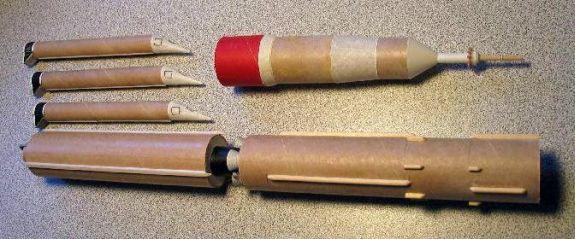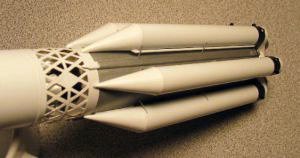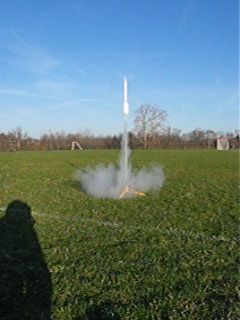Scratch Proton-Zond Original Design / Scratch Built
Scratch - Proton-Zond {Scratch}
Contributed by Drew Tomko
| Manufacturer: | Scratch |

Brief:
An approximately 1/120 sport scale model of the Soviet Proton-Zond, which sent
an unmanned capsule around the moon in 1968. I based it on a free paper model
of the Proton rocket available from Classic Paper Space Models (which now has a
version of the Zond launcher available). It is a single stage, 18mm powered
rocket, and recovers with an 18" parachute.
Construction:
The following parts were used:
- 2 BT-55 tubes, one 5.75" long and one 6.5" long
- 1 BT-20 tube 8" long
- 1 BT-50 tube 3.5" long
- 1 BT-50 tube cut down to approximately 1 1/8" diameter and 1.75" long
- 6 BT-5 tube 4 13/16" long
- 1/8" basswood strips sanded to half round for conduit (lots of these)
- 3/16" balsa stock cut into 3/16" strips for conduit
- 1/8" balsa dowel 2.5" long
- 1/4" launch lug 1.5" long
- styrene sheet and tube
- engine hook, launch lug, Kevlar® thread, shock cord, 18" parachute
- Classic Paper Space Models Proton enlarged and printed on cardstock
I began with the intention of making a "quick and dirty" Proton-Zond using only parts I had at hand. Of course, it became more complicated than I had planned. Still this is a fun, fairly straightforward build that results in a good looking sport scale model that flies quite nicely without fins. I used diagrams and dimensions I found on the internet and a few drawings graciously sent to me by another member of The Rocketry Forum. The main body consists of the BT-20 engine tube running through the two BT-55 sections, separated by a 13/16" gap for the interstage truss. The upper stages are made of the cut down BT-50 inside the standard BT-50 with a custom drawn shroud to connect with the BT-50 at the bottom. This is where the rocket separates for recovery, using a BT-55 coupler. Another custom drawn shroud (through lots of trial and error, mostly error, was needed here) forms the payload shroud. At the top, the balsa dowel is glued inside the 1/4" lug and centered in the cut-down BT-50. The nose cone is another custom drawn cardstock shroud. The paper model was used for the strap-on nose cones, interstage trusswork, engine nozzles and first stage detail. All the cardstock sections were coated with thin CA for strength and sanded smooth.

I spent a lot of time detailing the upper stages with plastic bits, tiny balsa nozzles for the escape tower, and styrene and paper for the stabilizing gratework that the Soviets use on man-rated rockets.
 Most of the
difficult work was in creating the cardstock shrouds. The conduit work was made
with basswood strip sanded to half-round and cut to size. I also simulated the
second stage engines seen through the interstage trusswork using paper engine
nozzles cut in half and glued to the BT-20 engine tube. The interstage is made
of paper carefully cut out with a sharp hobby knife. Just about all
construction was done with yellow carpenters glue and the plastic parts were
attached with CA.
Most of the
difficult work was in creating the cardstock shrouds. The conduit work was made
with basswood strip sanded to half-round and cut to size. I also simulated the
second stage engines seen through the interstage trusswork using paper engine
nozzles cut in half and glued to the BT-20 engine tube. The interstage is made
of paper carefully cut out with a sharp hobby knife. Just about all
construction was done with yellow carpenters glue and the plastic parts were
attached with CA.
Finishing:
The paint scheme is simple: aluminum for the first stage center tube, white for
most everything else. Black strips on the bottoms of the strap-on tanks, silver
for the engines, stabilizing grate frames, and red escape engine nozzles and
hatches.

Flight:
For recovery I ran Kevlar®
thread from the top of the BT-20 and attached a length of shock cord. After
balancing, I added 4 pennies inside the nose section and poured in some 5 min
epoxy. I stuck a length of Kevlar®
in the epoxy for the upper section recovery, attached the 18" chute to
that and connected that to the main section. The model balances about 1"
forward of the interstage trusswork and weighs in at 2.8 oz.
I was fairly certain stability would not be an issue with the strap-on tubes and nose weight. A swing test showed no wobble.
After a long snowy winter and rain soaked February, I waited a long time to launch this one! After a dry spell, I went out with a few motors and set up the first flight on a B6-4. Flight was beautiful with no instability and a straight path to about 300'. Ejection was just past apogee and descent was a little quicker than I would have liked but no damage even after hitting the ground on the paper engine nozzles. Another flight on a B6-4 was just as good. I think a C would be too much for this. It jumps off the pad pretty quickly on a B.
Summary:
Although I spent more time than I had planned, I am pleased with the way it
came out. I have always liked the look of Soviet boosters, and the Proton
complements the Vostok nicely. The upper stage has a lot of interesting detail,
and the finless design is sure to catch the eye. Because it is based on a paper
model, it can be made in different sizes very easily by enlarging the drawings.
If you are looking for something a little simpler, there are several flavors of
Proton, many with less complicated payload sections.
 |
 |